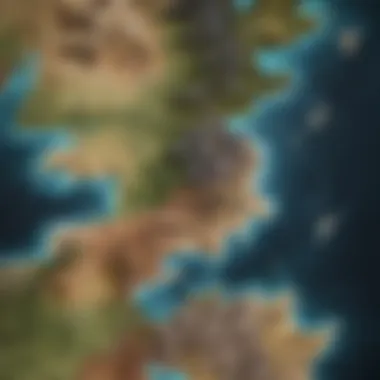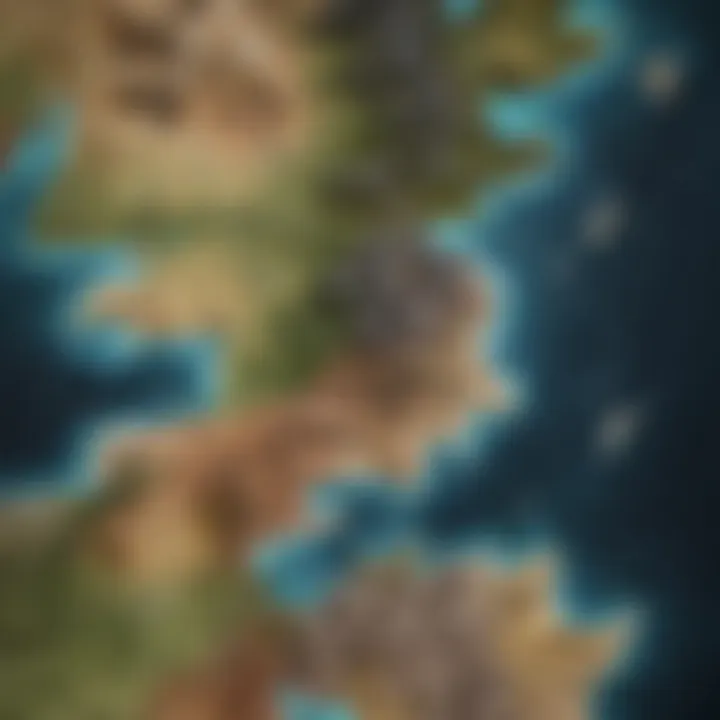Exploring the Seven Kingdoms of Game of Thrones


Intro
The realm of Westeros is a complex tapestry woven with threads of power, conflict, and intricate characters. Each of the Seven Kingdoms contributes uniquely to the rich narrative of Game of Thrones. In exploring these kingdoms, one uncovers not just geographical distinctions, but also deep historical roots and cultural nuances. This sets the stage for understanding the dynamics that drive the plot and character interactions throughout the series.
Character Dissections
Detailed analysis of key characters in Game of Thrones
Diving into the characters of Game of Thrones, it is crucial to recognize their roles within their respective kingdoms. Key figures such as Jon Snow, Daenerys Targaryen, and Tyrion Lannister embody the complexities of their houses and regions. Jon Snow, raised as a Stark yet an outsider, navigates the harsh realities of leadership and loyalty. His journey reflects the stark north's values of honor and resilience.
Daenerys Targaryen, on the other hand, represents the fire of the east. Her character arc showcases the struggle for power throughout Westeros, influenced by her heritage and quest for reclaiming the Iron Throne. Each character, through their distinct perspectives and motivations, shapes the narrative and intertwines with the overarching themes of the series.
Character development throughout the series
Character development is a key element in Game of Thrones. The transition from naive idealism to astute political maneuvers is evident in characters like Sansa Stark. Once a sheltered girl dreaming of knights and romance, Sansa evolves into a sharp leader who understands the harsh realities of the world around her. This transformation is significant; it illustrates how the kingdoms themselves influence personal growth.
Impact on the overarching storyline
The interactions among characters from different kingdoms highlight their central roles in driving the narrative forward. Betrayals, alliances, and conflicts create a web of intrigue that keeps viewers engaged. The relationships between the Starks of the North, the Lannisters of the West, and the Targaryens, among others, define critical plot points and significantly affect the fate of Westeros.
"Every action has consequences. The kingdoms of Westeros are bound not only by geography but also by the choices made by their leaders."
Lore Explorations
Delving into the rich history and lore of Westeros
Westeros is not only a land of physical kingdoms but also a realm steeped in history and lore. Each kingdom possesses its tales of glory and tragedy, rooted in ancient traditions. House Stark, with its motto "Winter is Coming," embodies a legacy of honor and sacrifice, deeply tied to the northern landscape and climate.
Uncovering hidden details and connections
There are connections between characters and historical events that influence their decisions. For instance, the past wars, such as the Robert's Rebellion, hold key insights into current rivalries and familial tensions. Recognizing these connections enhances the understanding of character motivations and plot developments.
Exploring the cultural and mythical aspects of the world
The mythology of Westeros enriches the narrative, adding depth beyond the visible conflicts. Legends about the White Walkers and the mythical creatures like dragons shape the backdrop against which human drama unfolds. This cultural layer is essential, offering fans a more immersive experience into the world.
Fan Theories
Compilation of popular and intriguing fan theories
The Game of Thrones community fervently engages in theorizing about the narrative direction. Various theories challenge perceptions of characters and foreshadow potential events. For example, discussions about the true parentage of Jon Snow reveal how fan speculation is often based on subtle hints dropped throughout the series.
Evaluation of theories based on evidence from the show
It's also crucial to evaluate the likelihood of these theories. While some ideas seem plausible, others may stem more from wishful thinking rather than grounded evidence. For instance, theories surrounding the significance of the Night King or the ties of the Stark family to ancient traditions often hold more credibility based on textual analysis.
Speculation on future plot developments
As Game of Thrones continues to expand its universe, many fans find themselves speculating on potential future story arcs. How will the balance of power shift as the series progresses? What new alliances may form? These questions drive discussions and keep the fandom alive as new content comes to light.
Foreword to the Seven Kingdoms
The Seven Kingdoms of Westeros represent a fascinating tapestry of history, politics, and culture within the Game of Thrones universe. Each kingdom is distinctly crafted, contributing to the intricate narrative that fans have come to love. This section serves as an essential entry point, guiding readers through the complexities that each kingdom embodies. Understanding the Seven Kingdoms is not just about knowing their names; it involves recognizing the significance of their interplay within the grander saga.
Overview of Westeros
Westeros is a vast continent, marked by diverse regions, each with its own identity and characteristics. This land is divided among the Seven Kingdoms, along with regions such as Dorne and the Iron Islands. Each kingdom is influenced by geography, climate, and historical events that have shaped its people.
For example, the harsh winters of the North foster resilience among its inhabitants, while the fertile lands of the Reach allow for abundant agriculture. The contrast between these areas illustrates the varied lifestyles and cultures present across the realm. Furthermore, the geographical barriers often contribute to the isolation of certain regions, creating unique challenges in communication and trade.
The map of Westeros also helps visualize these differences, highlighting major cities, landmarks, and territories. Thus, a brief look at the landscape reveals how each kingdom fits into the larger picture of Westeros.
Significance of the Seven Kingdoms
The Seven Kingdoms are more than just geographic divisions; they embody the political dynamics, alliances, and rivalries that drive the plot of Game of Thrones. Each kingdom has its own ruling house, and the relationships between these houses often dictate the course of events. For instance, the interplay between House Stark and House Lannister is central to the overarching story, illustrating themes of loyalty, power, and betrayal.
Moreover, understanding the significance of each kingdom provides insight into the motivations and actions of key characters. Analyzing these elements fosters a deeper appreciation of the story's complexity.
"The Seven Kingdoms are a reflection of human nature, showcasing our struggles for power, honor, and survival."
The unique cultures, customs, and histories of each kingdom enrich the vividly portrayed world of Westeros, making it imperative for fans to grasp not only who inhabits each realm but also how these realms interact with one another.


As readers delve further into the discussion of each specific kingdom, they will encounter the historical events that shape current realities, the families that hold power, and the individuals whose choices resonate throughout the narrative. This exploration into the Seven Kingdoms ultimately reveals how these elements work together to create a compelling and multi-faceted story.
The North
The North is the largest of the Seven Kingdoms, characterized by its harsh climate and vast landscapes. This region plays a pivotal role in the narrative of Game of Thrones. Its unique features, both geographic and cultural, shape many story arcs and character developments. The North represents strength, resilience, and tradition, which are key elements in the overarching themes of the series. The loyalties and conflicts originating from this kingdom have a profound impact on the political dynamics of Westeros.
Geography and Resources
The geography of the North is marked by its cold climate, vast forests, and mountainous terrains. The land is mostly rural, dotted with small villages and strongholds, with Winterfell being the most notable castle. Known for its ironwood trees, the North also houses rich resources such as cattle and fish, providing sustenance for its inhabitants. The prominence of the Wall, a massive fortification guarding the realm from dangers beyond, signifies the importance of this area in not just regional governance but also in the protection of the entire realm. The access to rivers, such as the White Knife, contributes to trade, although often limited by harsh weather conditions.
House Stark
Historical Significance
House Stark is the ruling house of the North, with a legacy that forms the backbone of Northern identity. Their ancestral seat, Winterfell, symbolizes resilience. Most notably, House Stark’s motto, "Winter is Coming,” encapsulates their awareness of danger and prepares them for challenges ahead. The Starks have a lore rich with honor and duty, valuing family ties and loyalty above all. Their historical significance lies not only in governance but also in the establishment of the North's moral standards, which resonate throughout the series, making them a central figure in the political landscape.
Cultural Values
The Stark family embodies the cultural values of the North, emphasizing loyalty, honor, and bravery. These principles shape their interactions with other houses and influence their decisions throughout the war. The cultural focus on family is particularly essential, as it drives actions based on kinship. In contrast, this sense of family loyalty can lead to tragic consequences, especially when the larger political intrigues are considered. The emphasis on duty often results in harsh but necessary decisions that highlight the complexities of leadership in a turbulent world.
Key Characters
House Stark is home to several key characters, each representing different thematic elements within the narrative. Eddard Stark, the head of the family, personifies honor and integrity. His sons, like Robb Stark and Jon Snow, showcase themes of sacrifice and duty. Each character's development contributes significantly to the understanding of the North's values, showcasing how personal choices impact the realm's fate. The choices made by these characters often lead to critical turning points in the story, reflecting the palpable tensions within the political landscape of Westeros.
The North's narrative is a critical reflection of the harsh realities that define the human experience—honor, loyalty, and sacrifice intertwined with survival.
The Vale
The Vale is a region in Westeros known for its majestic mountains and isolation. It is significant in the context of the Seven Kingdoms due to its unique geographic characteristics and the role its ruling house, House Arryn, plays in the political landscape. The Vale's natural defenses provide a stronghold against invasions, thus influencing the dynamics of power among the kingdoms.
Geographic Characteristics
The Vale is characterized by its high mountains and steep cliffs. The Eyrie, the seat of House Arryn, is perched atop a mountain, making it one of the most secure and impregnable castles in Westeros. The region's terrain includes numerous valleys and narrow passes, which further complicate any attempt at invasion. This natural fortification creates a sense of pride among its inhabitants, contributing to their distinct identity. The climate is somewhat mild, supporting agriculture and grazing, although agriculture is not as dominant here as in other regions.
House Arryn
Political Structure
House Arryn has a feudal system typical of Westeros, with the Lord of the Eyrie at its helm. The structure emphasizes loyalty among vassals. Each vassal house has direct obligations to support House Arryn in times of conflict. This arrangement has historically provided stability, as the ruling house exercises significant influence over its bannermen. One unique feature of House Arryn's political structure is the traditional practice of using the "Arryn" name in the titles of their bannermen, reinforcing loyalty to the house. However, this system can lead to conflicts when vassals have divided loyalties due to their own ambitions or ties to other houses.
Influence on Events
House Arryn's influence on events in Westeros is somewhat understated compared to other major houses. Historically, they have acted as stabilizers in the region, but their involvement in the broader political maneuvers can be limited. However, moments like Lysa Arryn's role in the War of the Five Kings illustrate how decisions made in the Vale can reverberate across the realm. The necessity for a strong ally can make the Vale a pivotal player during times of war. Thus, while their influence may appear indirect, it can shape outcomes significantly.
Major Figures
Key figures from House Arryn include the Lord of the Eyrie and notable characters such as Jon Arryn, who served as Hand of the King. His role was crucial in the initial power dynamics that led to the events of the series. Additionally, characters like Lysa Arryn showcase the complicated nature of loyalty and personal ambition within the house. Each figure contributes to the narrative, revealing the inner workings of political intrigue and the personal relationships that fuel conflict. Highlighting these figures adds depth to the understanding of House Arryn's impact in the series.
The isolation of the Vale creates a unique cultural atmosphere where loyalty and tradition hold great value.
Through the lens of the Vale and House Arryn, one can appreciate the intricate relationships and the consequences of political actions within the larger narratives of the Seven Kingdoms.
The Riverlands
The Riverlands serve as a crucial geographical and political region within Westeros. Nestled between the North and the South, this area is marked by a vast network of rivers and fertile lands. Its location makes it a strategic artery for trade and troop movements, providing both opportunity and conflict. The Riverlands are not just a landscape; they are a microcosm of the larger struggles that dominate the Seven Kingdoms.
Topography and Economy
The topography of the Riverlands is characterized by rolling hills, expansive river valleys, and numerous waterways. The Trident River is the lifeblood of this region, with its three major forks acting as key transport routes. This unique landscape has fostered a rich agricultural economy, which is vital for sustaining the kingdoms. The Riverlands boast lush fields that yield grains, fruits, and livestock. The result is that they have become a significant supplier of food to other regions, particularly during times of conflict.
House Tully
House Tully, ruling from Riverrun, epitomizes the cultural and political essence of the Riverlands. Their history is deeply intertwined with the land itself, shaping the identity of their people.
Family Dynamics
The family dynamics within House Tully are marked by strong loyalty and intricate relationships. The Tullys are known for their emphasis on familial bonds, often prioritizing blood ties over political alliances. This deeply rooted value system fuels their decision-making processes. The ability for the Tullys to navigate through personal loyalty reflects the overall theme of connections within the series. However, this characteristic may also lead to conflicts when family loyalty challenges their political rationale.
Role in the War
House Tully's role in the ongoing wars throughout the series is monumental. They provide significant military resources and alliances, leveraging this power to affect major battles. Their pivotal position often places them at the dead center of conflict, making their choices critically important. This aspect of their involvement illustrates the consequences of power play among the noble houses. Furthermore, their tendency to align based on loyalty can strategically strengthen or weaken their position, depending on the circumstances.
Key Events


The key events surrounding House Tully are defining moments that shape not only their fate but that of the Riverlands as well. Events such as the Red Wedding starkly highlight their political miscalculations and the brutality of the struggle for power. These occurrences serve as turning points in the wider conflict of the Seven Kingdoms; they illustrate how personal vendettas can spiral into large-scale consequences. House Tully's history is woven into the very fabric of the region, reinforcing their relevance within the overarching narrative.
"The Riverlands may seem peaceful, but underneath lies the current of ambition and betrayal that defines Westeros."
The Westerlands
The Westerlands stand out as one of the most affluent regions of Westeros in the Game of Thrones universe. Known for their rich gold mines, particularly the gold mines of Casterly Rock, the Westerlands symbolize both wealth and ambition. The economic prowess of this area becomes a central theme in illustrating the power dynamics of the Seven Kingdoms. Moreover, the cultural elements of the Westerlands intertwine with politics, shaping the actions of its nobility, especially House Lannister. This region plays a vital role in the overall narrative by serving as a point of conflict and intrigue, key to understanding the series' larger themes of power and loyalty.
Cultural Attributes
The culture of the Westerlands is heavily influenced by the status and the wealth of its ruling family. The Lannisters, being the most prominent house, set a standard that dictates not only wealth but also social behavior. Their motto, "Hear Me Roar!", emphasizes their pride and seeks to convey strength, influencing local customs.
Families within the Westerlands often exhibit a certain arrogance and an expectation of loyalty based on their status. The focus on personal honor and reputation is significant, driving much of the social interactions and alliances. Thus, the cultural attributes found in the Westerlands contribute to the intrigue that encompasses the region, where wealth brings both privilege and peril.
House Lannister
House Lannister is arguably the most notorious family in the Game of Thrones narrative. Their prominence is omnipresent, driving numerous storylines and interactions across the Seven Kingdoms.
Financial Power
House Lannister's financial power is one of their defining characteristics. Their wealth primarily stems from extensive gold mines, particularly in Casterly Rock. This financial clout enables them to exert significant influence over politics and military options. The ability to fund armies and sway decisions within the court demonstrates the advantage of their riches.
A key aspect of this wealth is how it shapes their identity. Financial power lends them confidence in negotiating with other houses, making them formidable players in the realm's politics. However, this power is not without its drawbacks; wealth can breed enmity among peers and lead to betrayal, as seen throughout the series.
Politically Driven Actions
The politically driven actions of House Lannister illustrate their strategic maneuvering in the quest for power. Their decision-making, often motivated by wealth and vengeance, contributes significantly to the tensions within the Seven Kingdoms. Through manipulation and alliances, they navigate threats and opportunities alike.
This approach to political affairs proves beneficial, granting them a solid position. However, their tactics often incite hostility, highlighting the risks involved in their ambitious pursuits. The weight of their decisions reverberates throughout Westeros, sometimes with devastating results.
Impacts on the Realm
The impacts of House Lannister on the realm are profound. Their financial and political maneuvers shape the course of events in the Seven Kingdoms, contributing to wars and shifting the balance of power. Their reputation precedes them, instilling both fear and respect among other houses.
One unique feature of these impacts is the way they intertwine with personal relationships. The Lannisters often find themselves at odds with allies and foes alike, demonstrating that the quest for power frequently results in complex dynamics. This complexity offers rich narrative possibilities within the Game of Thrones series, allowing for a deeper exploration of human motivations in conflict.
The Iron Islands
The Iron Islands, with their rugged terrain and bleak landscape, represent a distinct cultural and political entity within the universe of Westeros. They harbor a unique maritime culture that significantly shapes their identity and engagements with the other kingdoms. The significance of the Iron Islands lies in the resilience of their people, the Ironborn, who thrive in the harsh environment, emphasizing their seafaring lifestyle, which is central to their existence and culture.
Maritime Culture
The maritime culture of the Iron Islands is one of their defining features. The geography of the islands, being surrounded by water, has instilled a dependency on the sea for survival. Fishing, raiding, and shipbuilding are not merely activities; they are a way of life. The Ironborn's deep-rooted belief in the "Old Way" accentuates their valor in raiding and a sense of freedom that comes from life at sea. This culture impacts their relationships with mainland kingdoms, often seen as aggressive and reckless.
The Ironborn take considerable pride in their naval skills, often resulting in remarkable tactics during conflicts at sea. Their longships, designed for speed and agility, are a symbol of their identity. The combination of their geographical isolation and martial traditions leads to a society that values strength and cunning.
House Greyjoy
Background and Ambitions
House Greyjoy is the ruling house of the Iron Islands and is characterized by its ambition and aspirations for power both within and outside its realm. The Greyjoys have often sought to expand their influence and territory through naval dominance and strategic alliances. Led by Balon Greyjoy, who seeks to reclaim the dominance of the Ironborn, their ambitions often lead to conflict. This houses' quest to regain the prominence of their ancestors' seafaring legacy is a critical aspect of their narrative.
The Greyjoys' background is steeped in both honorable lines and controversial actions. They aim to reinforce their position by emphasizing their bloodline and heritage, illustrating why their ambition resonates well within the context of their storied history. However, such ambitions can lead to internal strife and power struggles, impacting their stability.
Significant Conflicts
Conflicts involving House Greyjoy are often significant, portraying their relentless pursuit of power. Notably, their rebellion against the Iron Throne during Balon Greyjoy's kingship marked a period of strife for the realm. The Greyjoys' inclination towards aggressive tactics impacts their standing in the larger political landscape of Westeros.
The Greyjoys navigate through various conflicts, sometimes aligning with other houses for strategic benefits, while at other times finding themselves at odds with long-standing rivalries. The complexity of these conflicts demonstrates their zealous nature and foreshadow critical shifts in power among the kingdoms.
Notable Characters
House Greyjoy houses several notable figures whose actions leave a lasting impact on the narrative. Characters such as Theon Greyjoy and Yara Greyjoy showcase varying dimensions of the Ironborn ethos. Theon, who grapples with his identity, represents the internal conflicts faced by the house itself. His journey from a proud Ironborn to a pawn in the game of thrones reflects the nuanced storytelling present in the series.
Yara Greyjoy stands as a figure of strength, embodying the ideals of the Old Way while challenging traditional gender roles. Her character not only reinforces the dynamics of House Greyjoy but also enriches the broader conversation about power and agency in the Seven Kingdoms.
Overall, the Iron Islands, through House Greyjoy, illustrate themes of ambition, conflict, and identity within the context of Westeros. Their story encapsulates the struggles of a people striving for recognition and power, thereby contributing to the overarching narrative of the Game of Thrones.
The Reach
The Reach is often regarded as one of the most fertile and culturally rich regions in Westeros. Its geography, characterized by vast farmlands and favorable climate, greatly contributes to its significance in the realm. The abundance of agriculture here not only feeds the local populace but also supports the economy of the entire Seven Kingdoms. Thus, understanding The Reach is pivotal, as it highlights the intersection of agriculture, economics, and political power in the fantasy world of Game of Thrones.
Agricultural Wealth


The agricultural wealth of The Reach is undeniable. This region is famous for its production of grains, fruits, and vegetables. The plains are dotted with numerous farms and estates, showcasing the hard work of the local lords and their laborers. The Tyrell family, being the primary power in this area, ensures that the lands are well cultivated and productive. The food surplus provided by The Reach is essential during times of war, as it can sustain armies and provide resources to allies.
- Bountiful harvests: The ideal farming conditions make The Reach a key supplier of food in Westeros.
- Economic stability: The agricultural output contributes significantly to the wealth of House Tyrell and its vassals.
- Social structure: The reliance on agriculture shapes the community, leading to strong local traditions and practices centered around farming.
House Tyrell
House Tyrell is the ruling family of The Reach and one of the wealthiest houses in Westeros. Known for their vast resources and political acumen, the Tyrells wield considerable influence over the realm. Their lordship is characterized by opulence and strategic marriages, which enhance their power.
Strategies and Tactics
The strategies of House Tyrell often revolve around their substantial agricultural wealth. Their ability to provide food and resources gives them significant leverage in political negotiations. They use their wealth to gain allies and strengthen their hold over the region. The Tyrells are known for their ability to navigate the complex political landscape of Westeros.
- Resource-based tactics: Leveraging their agricultural production allows them to make effective deals with other houses.
- Marriage Alliances: Strategic marital unions are a key characteristic of House Tyrell, as these often help to secure alliances and foster loyalty.
- Avoiding Direct Conflict: They tend to prefer strategies that enhance their position without direct confrontation, utilizing diplomacy effectively.
Influence on Alliances
The influence of House Tyrell on alliances can be felt throughout the Seven Kingdoms. Their wealth allows them to form critical partnerships. The Tyrells' connections often sway the fate of battles and alter the course of power dynamics across Westeros.
- Financial Support: Their ability to offer resources helps secure commitments from powerful factions.
- Political Maneuvering: House Tyrell understands the importance of aligning with the right houses, using their influence to shape the political landscape.
- Grand Aspirations: Their ambitions often bring them into conflict with other houses, highlighting the dangerous interplay between power and alliance.
Key Figures
Several key figures from House Tyrell have played significant roles in the narrative of Game of Thrones. Characters like Margaery Tyrell and Olenna Tyrell exemplify the cunning and strategic prowess of their house.
- Margaery Tyrell: Known for her charm and political savviness, Margaery plays a crucial part in House Tyrell's plans.
- Olenna Tyrell: Often referred to as the "Queen of Thorns," Olenna is a sharp-witted and influential matriarch whose actions leave a lasting impact.
- Willas Tyrell: Though often overlooked, Willas is important in understanding the family dynamics and succession of power within the house.
Dorne
Dorne is one of the most fascinating regions in the Seven Kingdoms. Its culture and traditions set it apart from others, making it significant in the overall narrative of Game of Thrones. Located in the southernmost part of Westeros, Dorne is characterized by its warm climate, unique customs, and distinct political landscape. Unlike other kingdoms, Dorne has its own traditions, which often clash with those in the North and the rest of Westeros. Understanding Dorne offers insights into the complexity of the Seven Kingdoms' dynamics.
Distinct Culture and Traditions
Dorne's culture is distinct from the rest of Westeros in several ways. It values individualism, sensuality, and a slower pace of life. This is reflected in their approach to governance, social interactions, and even their laws. For example, Dornish law allows for women to inherit titles and land, a rarity in a largely patriarchal society.
The traditions of Dorne include unique festivals and customs. The people of Dorne celebrate marriage differently, emphasizing personal choice rather than political alliance, which is common in other regions. This cultural independence fosters a strong sense of identity among Dornish people, making them proud of their heritage.
House Martell
House Martell, the ruling house of Dorne, is known for its strategic approach to politics that often contrasts with the brazen tactics of other houses. Their motto, "Unbowed, Unbent, Unbroken," embodies their resilience and defiance.
Political Strategies
House Martell utilizes careful political strategies characterized by patience and subtlety. They often avoid direct conflict, choosing instead to forge alliances and manipulate situations to their advantage. This distinct approach can be seen as beneficial for the overall goal of maintaining Dorne’s autonomy within the often tumultuous political landscape of Westeros. However, this strategy can also be seen as a disadvantage in scenarios that require immediate action.
The key characteristic of House Martell's strategy is its reliance on negotiation rather than warfare. This can often lead to lasting peace but may also risk appearing weak to more aggressive houses.
Revenge and Honor
Revenge and honor are central themes that define House Martell’s actions and decisions. The desire for revenge, particularly in the wake of the events surrounding the death of Oberyn Martell, drives many characters in Dorne. The significance of these themes lies in their contribution to the wider narrative, adding depth to the motivations of both individuals and families.
A key characteristic of this theme is the idea that honor is paramount, leading to drastic responses in the name of familial loyalty. While this can be seen as noble, it also has the potential to escalate conflicts and create cycles of violence.
Key Events
Several key events in the history of Dorne showcase its significance within the Seven Kingdoms. These events not only illustrate Dorne's unique position but also the intricate relationships with other houses.
One significant event was the marriage of Princess Myrcella Baratheon to Trystane Martell. It was a strategic move, but it also highlighted the complexity of relationships and the potential for betrayal. While it aimed to unite houses, it ended in disaster, further complicating the political landscape.
Key events often reflect the broader themes of revenge, honor, and the struggle for power within the Seven Kingdoms. As such, understanding these events helps to comprehend the unique role Dorne plays in the larger Game of Thrones narrative.
Culmination
The importance of the conclusion in this article lies in its ability to synthesize the intricate narratives and relationships present in the Seven Kingdoms. It consolidates the reader's understanding of how each kingdom's unique traits influence the overall story arc of Game of Thrones. This concluding section is essential for revisiting key themes of power, loyalty, and conflict.
Interconnectedness of the Kingdoms
The Seven Kingdoms are not isolated entities; rather, they are deeply interconnected through a web of alliances, rivalries, and shared histories. These connections often dictate the progression of events throughout the series. The dynamics between houses can lead to unexpected alliances or bitter betrayals, showcasing the fragility of power.
For instance, House Stark’s long-standing honor is frequently tested against the cunning of House Lannister. Their clashing ideologies serve as a compelling backdrop for many conflicts. Furthermore, the relationships across regions, like the Tyrells in the Reach and the Martells in Dorne, illustrate how local politics affect wider strategies.
Understanding these connections provides insight into character motivations and the decisions they make. The choices of prominent figures often ripple across the kingdoms, demonstrating that the actions in one area can incite reactions far away. This interconnectedness is pivotal, as it reveals the complexities of human relationships and the political landscape that Game of Thrones masterfully presents.
Legacy of the Seven Kingdoms
The legacy of the Seven Kingdoms extends beyond the events of the series. It prompts reflection on themes like honor, betrayal, and the cost of ambition. Each kingdom contributes unique lessons and frameworks applicable to broader life contexts. For example, the idealism of House Stark contrasts sharply with the pragmatic realism of House Lannister, embodying the perpetual struggle between morality and power.
Moreover, the impact of the Seven Kingdoms resonates in popular culture. Their stories have sparked discussions about governance, loyalty, and the human condition. As viewers analyze the narrative intricacies, they find that the lessons from Westeros echo in our own societal issues.
All these aspects create a rich tapestry that elevates Game of Thrones from mere entertainment to a profound commentary on human nature and political machinations. Ultimately, understanding their legacy allows fans to appreciate the nuance of storytelling in Westeros, leading to a deeper emotional engagement with its characters and their journeys.



